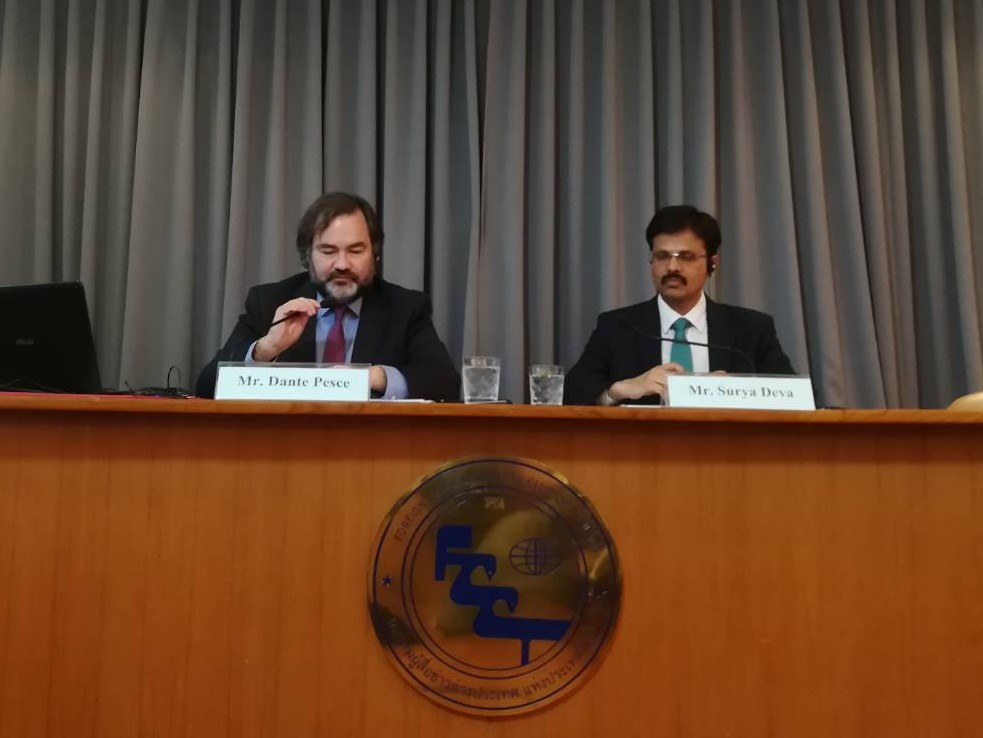Thailand has made notable improvements in eradicating human trafficking and forced labour from the fishing industry, according to UN experts. They said, however, one of the biggest challenges Thailand faces is curtailing the legal and physical intimidation of leaders and activists who speak out against corporate human rights violations.
Dante Pesce and Surya Deva, two members of the UN Working Group on Business and Human Rights presented their findings at a press conference on Wednesday after meeting with government officials and people in the business sector and civil society.
Over the past ten days they traveled to Bangkok, Songkhla, Chiang Mai, Khon Kaen and Samut Sakhon to meet with representatives of ethnic minorities, human rights defenders (HRD), civil society organizations (CSO) and migrant workers, as well as with people from the Chamber of Commerce, Thai Stock Exchange and other groups.
Dante Pesce and Surya Deva
The visit was initiated by the Thai government who has recently announced the Thailand 4.0 policy. As part of the policy, human rights are set as a national agenda. Over the past couple years, the Thai junta has made various efforts to improve the country’s legislation to match up international standards. For example, in June 2017, the junta’s National Legislative Assembly enacted the
Management of Foreign Workers’ Employment bill.
They praised the progress of the fishing industry — and the tuna industry in particular — after increased international attention over the past few years spurred threats of a ban on seafood exports, prompting speedy efforts to eradicate forced labour in the sector. Deva suggested the government replicate those same efforts to stamp out slavery and human trafficking in other industries.
Among proposed solutions to improve working conditions was the formation of labour unions. Deva said that they had a constructive dialogue with the Ministry of Labour over ratifying the ILO Conventions 87 and 98 that protect the right to organise. Pesce added that the representatives from the fishing industry that they spoke with respected that having organised workers is a good way to improve dialogue and problem-solving.
The Working Group raised several concerns of CSOs and HRDs that the practice of “attitude adjustments”, judicial harassments, and certain NCPO orders infringed on their ability to peacefully protest and voice their concerns about business-related human rights abuses.
They also highlighted the need for impact assessments of large development projects to include social impacts as well as environmental ones. They cited insufficient dialogue and engagement with communities as a source of social unrest and conflict.
Moreover, they are concerned over the new
mandate of the National Human Rights Commission of Thailand (NHRC). The mandate says the NHRC must criticise any human rights-related report which is perceived as ‘inaccurate’ or ‘unfair’ about the human rights situation in Thailand. The experts said this mandate is undermining the status of NHRC as an impartial institution.
The experts also touched on the migrant crisis, noting that several hundred thousand migrant workers remain undocumented despite the March 31 deadline to complete the national identification process. He encouraged the government to extend the deadline or facilitate other solutions to process the rest of the documentation.
Other topics touched on in the assessment included discrimination against women and the LGBTI community, the vulnerability of sex workers to exploitation, and the importance of enforcing human rights in the special economic zones (SEZs).
They issued a series of recommendations that the government should take to prevent corporate human rights abuses and commended the Thai government for inviting them and engaging with them. They said the government did not restrict them from meeting with anyone.
“This is a positive sign that despite the situation of the political climate, despite the limitations, they are open to engage with us and make these steps,” Deva said at the press conference.
The Working Group will produce a National Action Plan on Business and Human Rights later this year. Throughout the next year will follow up on their recommendations and present their final report to the UN Human Rights Council in June 2019.
In January, Human Rights Watch published a
report entitled “Hidden Chains: Forced Labor and Rights Abuses in Thailand's Fishing Industry.” HRW argued that migrant workers in Thailand, especially in the fishing industry, experience labour abuses and low pay due to the government’s failure to suppress human trafficking.

